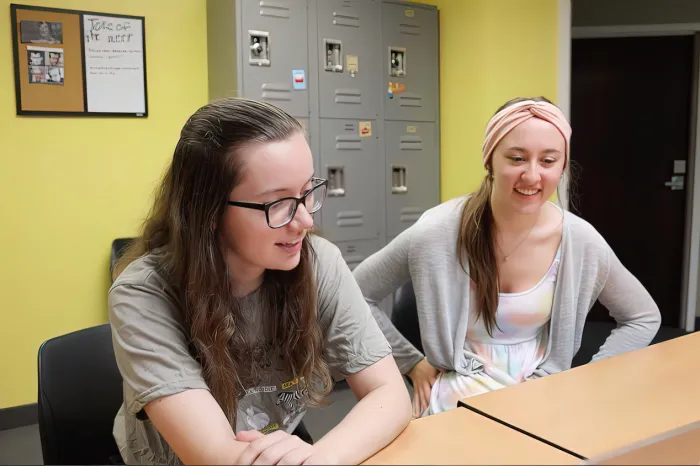
Sitting at a picnic table near the Bartlett porch during a particularly hot day in June, Kennedy Couch ’24 and Dr. Suzanne Parsons checked data on their laptops before heading into a lab in the Rickey Science Center to check on the melanoma cells that Couch grew.
Under the guidance of Parsons, who is a McCoy Associate Professor of Biochemistry, Couch worked for six weeks this summer on her research project, “The Effects on Different Parabens on Cholesterol Levels in Melanoma Cells.” Couch was one of four students selected for the Investigative Studies program, which provides a stipend for students to conduct research or pursue a creative project. Each student is teamed up with a faculty member, who also receives a stipend.
“Some people think you have to go to a big research institution to gain this experience, but Kennedy is conducting research at that level right here at Marietta,” says Parsons, who is the Director of the Investigative Studies Program. She has mentored a student in this program nearly every year since 2013.
Psychology major Olivia Dunlap ’23, who was mentored by Dr. Charles Doan, studied “Unsupervised Categorization Behavior Among Different Developmental Populations.” Her work examined concept learning in adolescents and how it may be related to Attention-Deficit Hyperactivity Disorder. Madeline Kuhl ’23, who is also a Psychology major, teamed up with Dr. Ali Doerflinger for her project, “The Effects of Depression and Anxiety on Ability to Concentrate.” Her volunteer test subjects completed surveys and also underwent an eye-tracking task on a computer. Ashley Manion ’24, who is majoring in Theatre and Music, wrote: “A Musical Summer” for her artistic project, which she worked on with Associate Professor Andy Felt. The project involved songwriting and scene writing.
Students interested in the program submit an application package, get a recommendation from their faculty advisor, have an additional faculty reference who can talk about their ability to carry out the project, and also write a proposal that provides background, methodology, current knowledge of the topic, and what they plan to do. Students also write about their expected personal and professional outcomes regarding the project, as well as where they plan to present their research findings or creative project. A faculty committee then chooses the students who can participate in the program. In addition to the stipend, students can live on campus for the duration of their research if they choose.
Parsons is working with the Advancement Office to find support for more students who want to conduct research or pursue creative projects through the Investigative Studies Program. It costs about $5,000 for each student project, but the experiential learning that takes place is priceless.
“This internal opportunity for the summer fellowship is so important,” Parsons says. “If students can get research or a creative project done in between their sophomore and junior year, the world is their oyster. I’ve had students go to national and to regional conferences, and REU fellowships run by research institutes. I firmly believe that the reason they get picked for those experiences is because of the research they’ve done the previous summer. This program sets them up for being accepted into really elite programs — we have one student working with NASA, and a big part of that is because she did the summer fellowship last year.”.”
Dr. Josh Jacobs, Vice President for Advancement agrees.
“Undergraduate summer research with a faculty partner is a wonderful way for students to expand their educational opportunities and prepare for graduate programs and the workforce,” Jacobs says. “In time, we hope to expand this program so every student on campus could compete for a donor-funded summer research project in their department.”
Manion worked with Felt to create “A Musical Summer (An Original Musical Development), which combines both of her majors. Though the project was ambitious, she was confident that her musical would be ready by the Fall Symposium, which is when all Investigative Studies students present their projects to campus.
“I chose this project because I believe that I could make it in this industry with more experience, no matter how slim those chances are,” Manion says. “I want to allow people to invest in what I am creating, whether that's through a monologue I've written or a song that I've worked on. This project is the start of an extremely valuable test-run for me, and that is something that is rare to come by.”